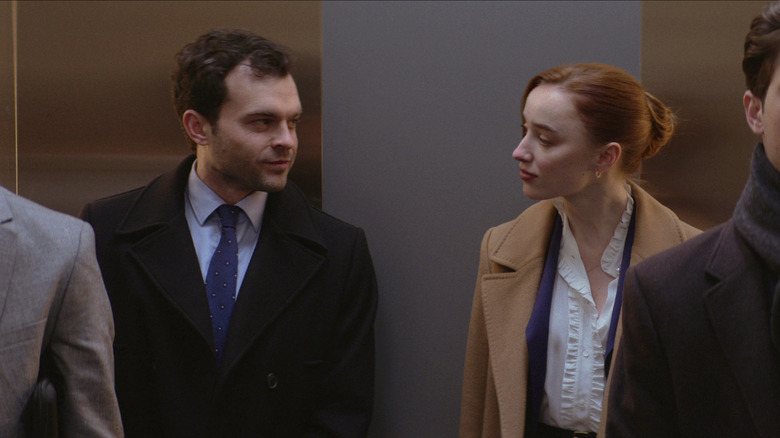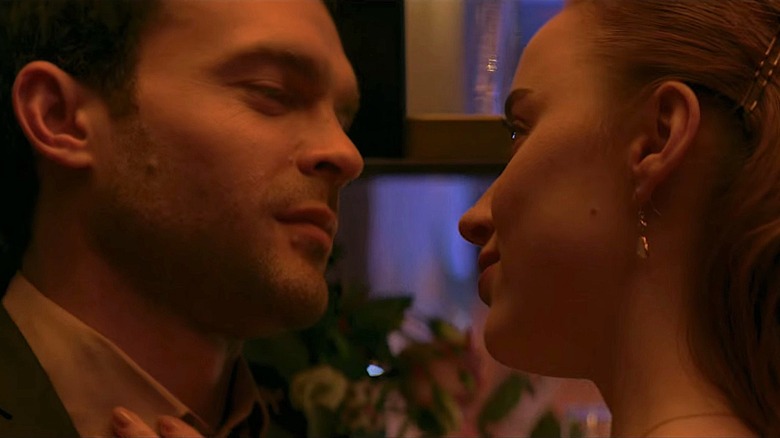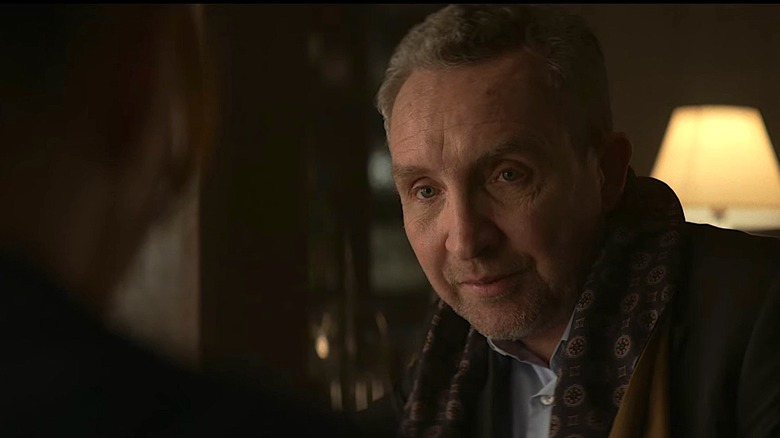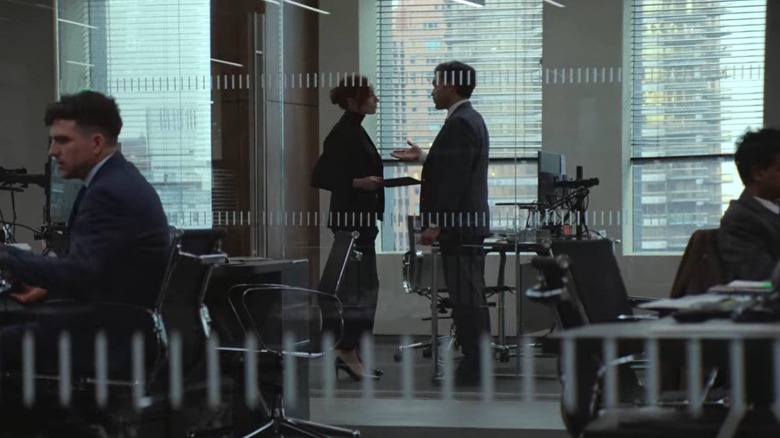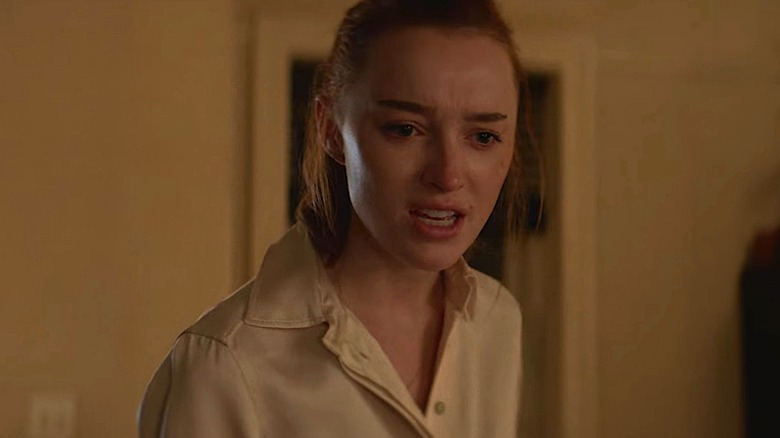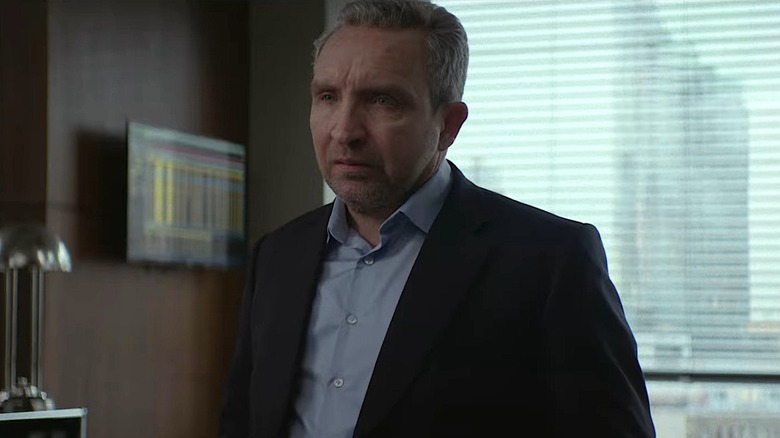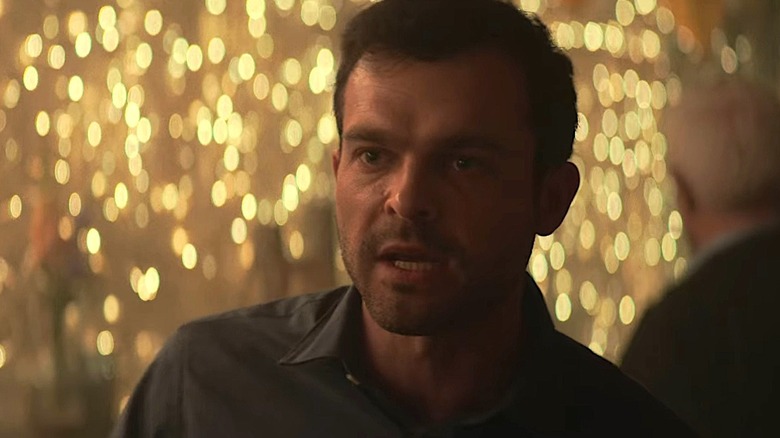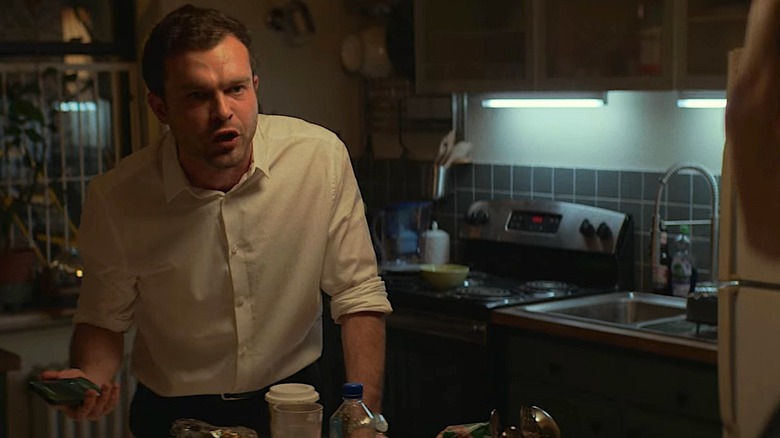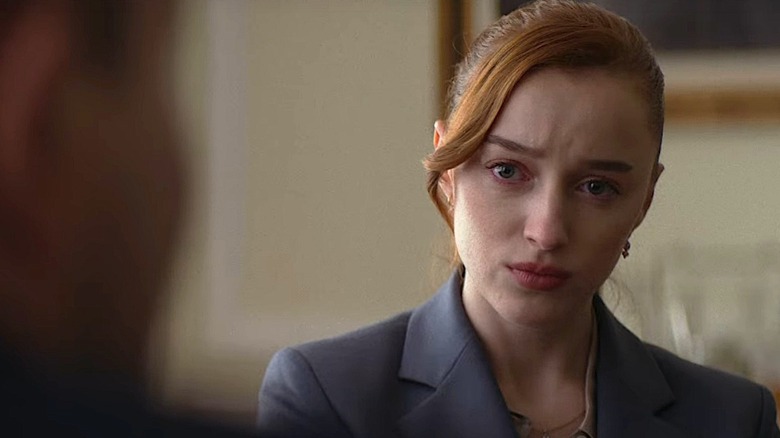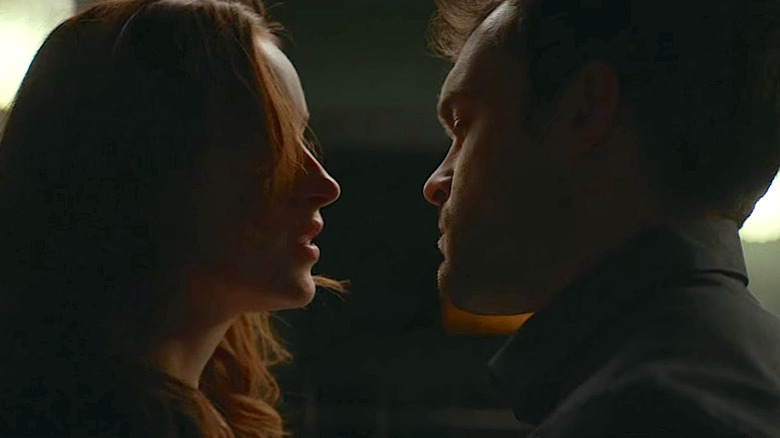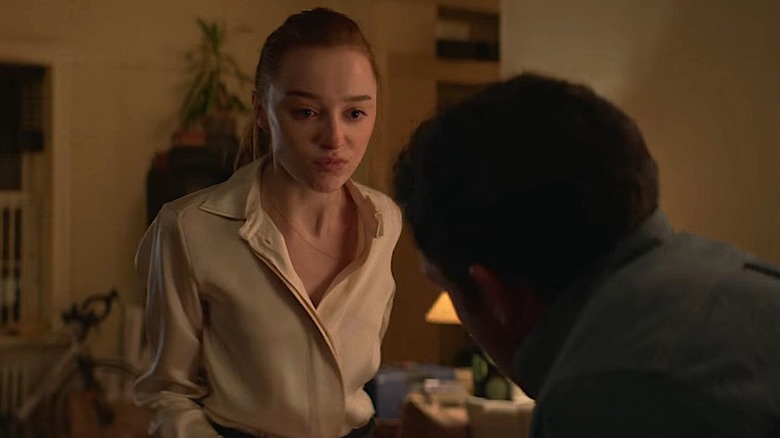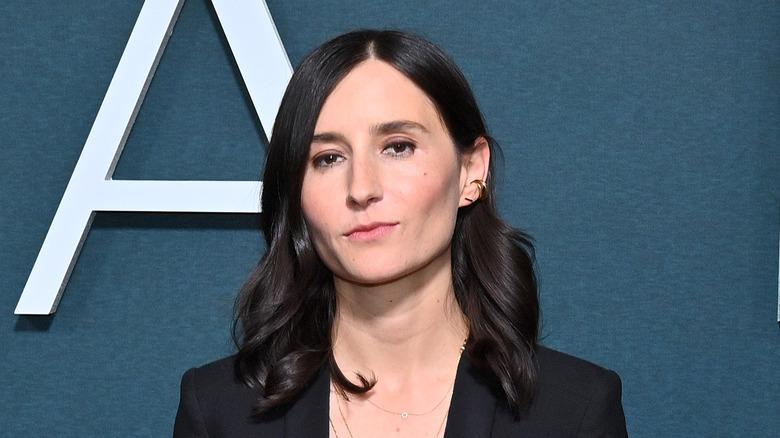The Ending Of Netflix's Fair Play Explained
Contains spoilers for "Fair Play"
Netflix's "Fair Play" draws blood in more ways than one. Starring Phoebe Dynevor ("Bridgerton") and Alden Ehrenreich ("Cocaine Bear"), "Fair Play" starts as an erotic thriller and ends as a survival thriller — or, honestly, an all-out horror movie.
"Fair Play" grapples with gender politics in a gut-punching and gruesome way — which might not be expected, considering the film's steamy trailer. Even though the movie built serious Sundance buzz, it stars veterans of typical romance franchises — or, in the case of Ehrenreich, would-be franchises, like "Beautiful Creatures." Maybe this decision was a very deliberate choice by writer/director Chloe Domont.
The casting of Dynevor and Ehrenreich plays with the audience's trust in so-called romantic leads, just as Ehrenreich's character shatters the entire concept of trust, romantic or otherwise, for Dynevor's. It's truly a wicked web we weave when threatened by a loved one's success, so let's unravel it as best we can before the market on non-toxic relationships totally crashes. Read on for the ending of Netflix's "Fair Play" explained.
What you need to remember about the plot of Fair Play
The relationship in "Fair Play" starts off promising enough. Emily (Phoebe Dynevor) and Luke (Alden Ehrenreich) are a happy and healthily frisky young couple. So frisky, in fact, that little things like Luke's brother's wedding reception and a certain time of the month can't slow down their ardent urges. These two crazy kids can't keep their hands off each other. Luke proposes, Emily accepts, and everyone ends happily ever after. Until the morning.
Luke and Emily leave their shared apartment only to reunite at their shared workplace, a hedge fund. There, their relationship is secret — as well as against the cutthroat company's policy. Luke and Emily are both good at their jobs, supportive of each other, and ambitious. When Emily thinks Luke is up for a promotion, they celebrate with passion and champagne. Luke talks about how he's sure to get Emily on his level soon. It looks like these two are poised to take the New York finance world by storm as a team. That is, of course, until Emily gets the promotion instead of Luke.
The truth is, Emily is even better at hedge funding than Luke, and way more dedicated. Luke is initially supportive but clearly hurt, and Emily feels bad for her success. Emily tries to help Luke get promoted, which ends up backfiring on her. In fact, the more Emily's skills are recognized at work, the more unhinged and jealous Luke becomes. He withholds affection, and turns sour and violent. Emily's world falls down around her, fast. By the end of "Fair Play," she must decide who is truly worth investing in: Her psychotically jealous fiancee, or herself.
What you need to remember about Emily's success in Fair Play
"I don't know many 17-year-olds who get published by the Wall Street Journal," assesses Campbell (Eddie Marsan), Emily's divinely terrifying boss, before he offers her a life-changing promotion. Campbell references the quote Emily gave the Journal, about how the true key to success is "learning the rules" and "navigating within one particular box." Campbell challenges Emily's narrow view of how she can climb the corporate ladder, and sees incredible promise in her work.
He should. Emily busted out of a working-class existence by winning a scholarship to Harvard, then tested her mettle working at Citi and Goldman. Campbell also notes Emily made the top calls of last quarter. In most of the film's scenes, Emily is shown as the only woman working for Campbell. It's a silent, visual cue that Emily's skills are so extremely prized, that she's able to break some typical boys' club rules. Multiple scenes also show that Emily studies everything relating to her work, and is able to keep her finger on the pulse of trends that can make her company profitable.
Emily's competence, dedication, and excellence in her work are in direct contrast to Luke's hysterical accusation in the middle and end of "Fair Play" that Emily only got her promotion because of her looks, sex appeal, and the mandate to fill diversity quotas. In fact, Luke barely rates with Campbell at all, unless it is because of the amount of money he has cost the company by taking uneducated and impulsive risks.
What happened at the end of Fair Play
Encouraged by the idea of healing the rift between her and Luke, Emily takes Luke's advice for a risky financial call — and the company comes up short. Campbell is furious that she followed Luke's lead. Emily figures out a saving grace solution on her own, and tries to regain intimacy with Luke. He refuses her, and grows even colder than before. Emily is unsure of how to proceed with their upcoming and still secret engagement, and continues to tolerate Luke's abusive behavior and her mom's aggressive party planning.
But when Luke prostrates himself before Campbell for a similar promotion to Emily and is soundly rejected, he disappears — only to emerge as a thorn in Emily's side. Luke drunkenly destroys an important work presentation of Emily's and reveals their forbidden relationship. Then, he shows up at their engagement party acting like nothing happened. Emily tries to throw Luke out of the party. Instead, she responds positively when he kisses her in the bathroom. But when he gets violent, she repeatedly asks him to stop, and Luke rapes her.
Emily covers for the relationship at work, telling Campbell that Luke is a stalker of hers. Campbell seems to know she's lying, but doesn't care. She is forgiven in his eyes. Emily returns home to find Luke, calm and ready to move out. Heartbroken and furious, Emily is moved to strike the now-emotionless Luke with a steak knife to get him to cry — and finally apologize.
What the end of Fair Play means
"Fair Play" is an examination of how toxic ideas of gender roles can push people to extremes. For Emily, that twisted existence lies in what she feels she must do to balance her work life and goals with her role as Luke's girlfriend. For Luke, the conflict is represented by how a successful woman — even one he loves — is untenable if her success comes before his own.
At the beginning of "Fair Play", Luke is supportive of Emily. But when Emily is promoted, Luke's emasculation is a slow poison. Though Emily does everything in her power to prioritize Luke's feelings over her own success, his view of her becomes clouded with jealousy and suspicion. Surely, if she is successful faster than he is, he posits, it's because she was taken advantage of sexually — or that she flaunted her sexuality for favors.
Luke's misogynistic line of thought is terrifyingly familiar. So is Emily's willful refusal to believe that the man she loves could have transformed into so hateful an individual so quickly. The end of "Fair Play" sees Emily taking some of her own stolen power back from Luke. "If I can't make you cry, I'm going to make you bleed," she cries, as she slashes Luke's regret-free form. If toxic gender politics have pushed Luke into jealousy, self-destruction, and attack mode, his denial that there are consequences to his actions pushes Emily into slasher territory.
Why doesn't Campbell value Luke over Emily?
At first, Emily and Luke seem evenly matched at work. But it quickly becomes apparent that Luke isn't as committed, especially when he has to work directly under Emily. When Emily asks him to prioritize researching a financial lead of hers that ultimately nets the company a huge profit, Luke is whiny about it. He drags his feet whenever Emily makes work suggestions, but is quick to celebrate his "promotion" based on something she overheard.
Luke also pushes Emily to make impulsive, poorly-researched decisions to impress Campbell. Of course, Campbell only loses respect for Emily when she takes Luke's advice over her own instincts. "He's there to guide your vision, not steer it," Campbell sneers. Luke will never recover from making his earlier "unicorn" stock decision that cost the company millions, and Luke proves he can't make good decisions when he pushes Emily to chase his new unicorn.
When Luke begs Campbell to promote him to Emily's level in a fit of "American Psycho"-style corporate devotion, Campbell scoffs. What Emily can't see through the fog of love has long been obvious to Campbell: Luke is inferior to Emily. Campbell only hired him as a favor, and can't wait for the day Luke quits. Luke finally does quit. However, his humiliation in front of Campbell further only fuels his attacks against Emily, rather than any positive change in his own work ethic.
Why does Emily stay engaged to Luke for so long?
Emily's feelings of betrayal, anguish, and loss ratchet up over the course of "Fair Play" — so much so that she is driven to violence by the final scene. However, though Emily is right to be furious with Luke, to fear him, and to demand an apology from him, they do stay engaged for a long time after his reign of terror begins. Why?
Why does Luke think he can behave like a psychopath, attempt to ruin her job, rape her, and then still show up to their engagement party as if everything is fine? Why does Luke think he can get away with gaslighting Emily after effectively trying to destroy her life because of his own bitter jealousy? It's easy to forget that by the end of "Fair Play," so much has changed between Emily and Luke. Their engagement and her promotion are fairly recent.
Emily is still reeling from Luke's sudden change. That's why she does everything she can to make her success more palatable to Luke — she's hoping his behavior is temporary. But by the end of "Fair Play," Emily is over Luke's terrible treatment. She calls him out for ending their relationship so destructively, still working to give Luke a chance to be respectful once again. He answers her ache for intimacy, apology, and logic by assaulting her — and Emily starts the process of cutting ties with Luke, as well as cutting him.
How does Luke's seminar influence the end of Fair Play?
Luke grows increasingly influenced by a motivational business speaker throughout "Fair Play", and his poisonous ideas combine with Luke's insecurity to create an intensely destructive ending to the movie. "How do you turn a decided mind?" asks the snake-oil salesman Robert Bynes (Patrick Fischler) in a series of video seminars Luke shells out big cash for, instead of just communicating with Emily about his feelings.
Rather than confronting the root of his issues with Emily's promotion, Luke subscribes to Bynes's line that people can be manipulated into believing the version of reality his followers decide on. The seminars are basically encouragement for Luke to begin breaking Emily down. Luke comments on Emily's way of presenting herself, how she doesn't really deserve her promotion, and criticizes how available she makes herself to Campbell and other company men.
Bynes's rhetoric is essentially business incel, and Luke eats it up in his vulnerable state. He uses the supposed confidence he gains from listening to this toxic hypeman to set his relationship with Emily on fire — as well as to tank his own chances at working in finance at all. Luke's drunken stunt during Emily's work presentation stinks of turning decided minds. He decides that if Campbell and company are foolish enough to waste Luke's clear potential (eyeroll), he'll change their minds by making Emily look terrible as well, confessing their secret relationship to them while also ruining a client meeting.
Why does Emily lie to Campbell about Luke?
After Luke's stunt at the end of "Fair Play", Emily tries to run tactical damage control. It's yet another potent example of the hoops women need to jump through in the workplace, even when they are not at fault for abusive behavior. By this point in the movie, Emily has given up romantic hope for Luke — but the consequences of Luke's outburst fall squarely on her shoulders.
There isn't supposed to be interoffice dating in their company, and it's likely even more frowned upon because Emily is Luke's superior when he reveals their relationship to Campbell. Luke also knows the office discovering the truth about their romance will take Emily down a few pegs with her coworkers, who seem to admire (but also objectify) her. Her taste will be questioned, and her lies will make her seem dishonest. No matter that all the guys in this office seem about as trustworthy as any "Wolf of Wall Street" character — it's different for Emily. She's a woman, and the harsh spotlight is on her.
Emily tries to spin Luke's relationship reveal as the ramblings of a stalker. Campbell may or may not see right through her, but either way, he sends the message that Luke isn't her problem. She should scrape him off her shoe, and get to work. It's the thinnest, grimmest silver lining on the dark cloud that is Emily's work situation.
Why do Emily and Luke kiss during the fight at the end of Fair Play?
Despite the wretchedness Luke has brought down on Emily, not so long ago he was romancing her. Even a few weeks of no intimate contact with Emily has her feeling starved for his affection. The fact that they were so intimately connected before makes it hard for Emily to fully break away from him — especially in the final bathroom scene in "Fair Play."
The movie opens with a sexy scene in a bathroom at a family party, and it ends the same way — at first. Luke's wild shift in behavior and her longing for intimacy have her in a headspin. Even though she's horrified by Luke, in this scene, she still has feelings for him — which Luke takes advantage of, using his issues with obsession, possession, and anger.
When Luke embraces Emily in the final bathroom scene, it's stomach-lurching. This is the moment where an '80s or '90s erotic thriller might have the two kiss and make up. We see that Emily longs for some kind of reconciliation, at this for a moment. But it's soon clear Luke only wants to be intimate with Emily at this moment to violently assert his dominance over her.
Why does Emily cut Luke at the end of Fair Play?
Luke's appearance in Emily's apartment at the end of "Fair Play" feels like a horror movie moment. He's raped her and attempted to destroy her livelihood, not to mention made things very difficult between Emily and her entire family. Then he has the gall to act like any other boyfriend with whom things just didn't work out, sorting out packing details with a maddening calm.
Emily, meanwhile, is so frightened and shocked to see Luke in her apartment, that she's shaking with emotion. She knocks over a cutlery container in the process. Luke betrays the fact that he still hates her guts by not moving to help her at all, and his gaslighting finally leads her to grab a knife with trembling hands. When he refuses to give her an apology or explanation one last time, Emily slashes Luke with the knife, drawing blood.
Emily is not trying to kill Luke. She's not even trying to scare him. Emily is trying to get some proof she isn't crazy for having loved Luke up until the point that he let her promotion drive him insane with jealousy. Emily is trying to get one last glimpse of Luke's humanity. When she can't get that, she wants him to admit he is nothing. "If I can't make you cry, I'm going to make you bleed," she says. Her voice and hands might shake, but her aim is true.
What has the crew of Netflix's Fair Play said about the ending?
The ending of "Fair Play" is so powerful because of Dynevor and Ehrenreich's intensely connected performances. Those performances are guided by Domont's tense script and unsettling staging. Material of this nature is not often handled in movies today, least of all without making the woman the psychopath character. Still, "Fair Play" strikes a balance between thrilling fun and stomach-flipping terror, without providing any pat answers about gender roles in work and play.
The movie also clearly strikes a chord with audiences, spending time in Netflix's Top 10 as well as, according to multiple interviews with the cast and crew, getting a standing ovation at Sundance. This is incredible, considering the dark heart the film explores. "This is not a film about female empowerment," Domont tells The Independent. "It's about male fragility."
"The way that Emily holds him accountable is in a brutal, ugly way," Domont continues to Entertainment Weekly. "Emily tries to use her words in that final scene to confront him, but this is a man who refuses to be held accountable on any single level. If she wants to hold him accountable, she's going to have to use the same physical force that he used against her." It's a miserable moment after a betrayal, and proof that all is not fair in love and war — especially when it comes to expectations of who should succeed, and how.
